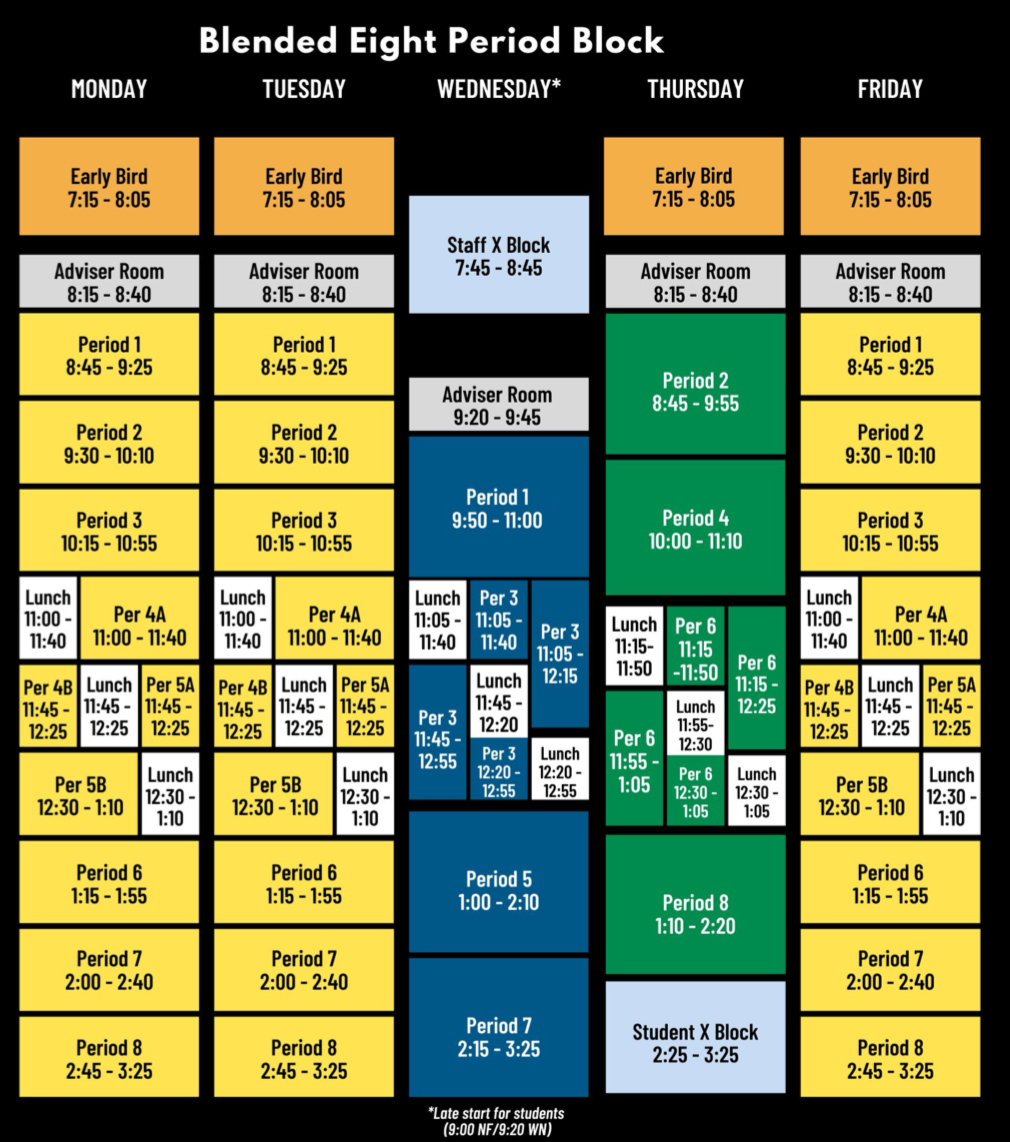I’m sure high school has stressed out every student at some point, and a little extra sleep and time in the morning could help them get back on track. Some high schools, such as Niles North High School, implement weekly late starts in their schedule. However, New Trier High School doesn’t do this, and school officially starts at the same time every day. Students need a break.
At the Winnetka Campus, school starts at 8:20 a.m. every day, except for Early Bird (EB) classes, with science at 7 a.m. and Kinetic Wellness at 7:20 a.m. However, another alternative schedule examined by the New Trier Board of Education in January 2021 kept New Trier’s eight-block schedule while adding a late start at 9:20 a.m. every Anchor Day.
Nevertheless, the schedule failed because it didn’t best support the New Trier community’s values, which are keeping class options open for students, creating consistent class times for all courses, maintaining student support times, having a manageable schedule for both students and staff, and creating flexibility for a hybrid schedule if needed.
While the board tried compensating for this with other late start and early dismissal days throughout the school year, it still isn’t enough for all students. Thus, I ask the New Trier Board of Education to reconsider its decision and give students a weekly late start day.
Besides Niles North, other high schools like Waukegan High School have a late start day almost weekly.
“Occasional late start days, scheduled on the first Monday of each week, provide a break from the routine,” Waukegan’s website says. “These days offer students additional sleep, enhancing their well-being and attentiveness, while allowing teachers time for professional development.”
Waukegan’s strategy is a win-win for students and staff. If New Trier implemented something like it, it would promote our mission statement: “To commit minds to inquiry, hearts to compassion, and lives to the service of humanity.” By improving students’ focus, New Trier would better commit students’ minds to inquiry.
As Waukegan’s website mentioned, its late start days benefit students by allowing them to sleep more. New Trier students could possibly reap the benefits from that as well.
I am enrolled in an EB science this year, so I start school at 7 a.m. Every day, I wake up at 6 a.m., rush to school because I live 15 minutes away, and then sit in my EB class, tired. This is often the case for other EB students too, and some students have it even worse than I because they have to leave earlier to ensure they get to class on time. So, I’m not the only EB student struggling a little bit.
Fortunately, I get to sleep in for an extra hour on Anchor Days as EB doesn’t meet, but even that isn’t simply enough for me to endure an entire Anchor Day. That said, EB students aren’t the only people who need late starts. I remember last year, when I was not enrolled in an EB, my schedule’s repetitiveness drained me at times.
Imagine what improvements New Trier could see in student performance because of sleep’s benefits.
“Sleep is absolutely instrumental in cognitive function, mental acuity and the ability to concentrate and learn new things,” according to the American Heart Association.
With the benefits of more sleep, New Trier could set students up better for success and be able to further enable them to “commit [their] minds to inquiry,” but also “commit hearts to compassion and lives to the service of humanity,” as their mental performance will improve, thus opening more room for attention to the other two parts of the school’s mission statement.
With a late start, students can choose how to spend their morning to best benefit themselves. For example, students could distribute their homework between the morning and night, ensuring they don’t cram all their homework the night before and get adequate sleep. Students could improve their physical well-being by simply sleeping in. Also, students could choose to do fun activities which helps alleviate accumulated high school stress, and still be able to arrive at school on time.
Within the last couple of years, New Trier has increased its focus on student attendance. Pre-existing studies suggest that late starts help solve the problem.
“Later start times also generally correspond to improved attendance [and] less tardiness,” according to the National Library of Medicine.
Students aren’t the only people winning with late starts—the New Trier administration also benefits from improved attendance and higher grades.
I ask the board to reconsider how a weekly late start day will lessen the toll the current school start time takes on students. Also, a weekly late start day will not only benefit students, but New Trier as a whole through student improvements.






































